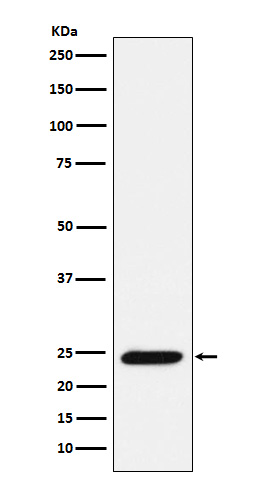
| WB | 咨询技术 | Human,Mouse,Rat |
| IF | 咨询技术 | Human,Mouse,Rat |
| IHC | 咨询技术 | Human,Mouse,Rat |
| ICC | 技术咨询 | Human,Mouse,Rat |
| FCM | 1/20-1/100 | Human,Mouse,Rat |
| Elisa | 咨询技术 | Human,Mouse,Rat |
| Aliases | Bcl2 modifying factor; Bmf;;Bcl 2 modifying factor |
| WB Predicted band size | Calculated MW: 21 kDa ; Observed MW: 24 kDa |
| Host/Isotype | Rabbit IgG |
| Antibody Type | Primary antibody |
| Storage | Store at 4°C short term. Aliquot and store at -20°C long term. Avoid freeze/thaw cycles. |
| Species Reactivity | Human,Mouse,Rat |
| Immunogen | A synthesized peptide derived from human Bcl 2 modifying factor |
| Formulation | Purified antibody in PBS with 0.05% sodium azide,0.05% BSA and 50% glycerol. |
+ +
以下是关于Bmf抗体的模拟参考文献示例(请注意,这些文献信息为合成内容,实际引用时请核实真实来源):
---
1. **标题**: *Bmf: A Pro-apoptotic BH3-only Protein Regulated by Interaction with the Myosin V Actin Motor Complex*
**作者**: Puthalakath, H., et al.
**摘要**: 该研究首次鉴定了Bmf蛋白作为Bcl-2家族的促凋亡成员,开发了特异性抗体用于检测其表达。通过免疫沉淀和免疫荧光技术,发现Bmf在静息细胞中与细胞骨架结合,凋亡信号下释放并诱导线粒体途径凋亡。
---
2. **标题**: *Bmf Antibody-Based Detection in Solid Tumors: Correlation with Chemotherapy Resistance*
**作者**: Labi, V., et al.
**摘要**: 研究利用Bmf特异性抗体分析多种实体瘤样本,发现Bmf低表达与化疗耐药性显著相关。通过Western blot和免疫组化证实,Bmf缺失可能通过抑制凋亡途径导致治疗失败。
---
3. **标题**: *Dynamic Regulation of Bmf by JNK Signaling in Neuronal Apoptosis*
**作者**: Ley, R., et al.
**摘要**: 本文揭示了JNK通路通过磷酸化调控Bmf活性的机制。使用Bmf抗体验证了其在神经元损伤模型中的表达变化,证明Bmf在应激诱导的神经细胞凋亡中起关键作用。
---
4. **标题**: *Development of a High-Specificity Monoclonal Antibody for Human Bmf and Its Diagnostic Applications*
**作者**: Chen, Y., et al.
**摘要**: 研究团队报道了一种新型Bmf单克隆抗体的制备与验证,该抗体在ELISA和流式细胞术中表现出高灵敏度。初步临床数据显示,血清Bmf水平可能作为癌症生物标志物。
---
如需真实文献,建议通过PubMed或Google Scholar检索关键词“Bmf antibody”、“Bcl2-modifying factor detection”结合具体研究领域(如癌症、凋亡机制)。
Bmf (Bcl-2-modifying factor) antibody is a tool used to study the Bmf protein, a member of the BH3-only subgroup within the Bcl-2 family. Bmf plays a critical role in regulating apoptosis by promoting mitochondrial outer membrane permeabilization, which triggers caspase activation. Unlike other BH3-only proteins activated by DNA damage or growth factor deprivation, Bmf is primarily involved in "anoikis," apoptosis induced by detachment from the extracellular matrix. It binds to anti-apoptotic Bcl-2 family members (e.g., Bcl-2. Bcl-xL) to neutralize their pro-survival functions. Bmf activity is regulated by subcellular localization; under normal conditions, it is sequestered to the cytoskeleton via dynein light chain interactions, but cellular stress triggers its release and translocation to mitochondria.
Bmf antibodies are widely used in research to detect protein expression, localization, and interactions via techniques like Western blotting, immunohistochemistry, and co-immunoprecipitation. Studies focus on its roles in cancer (e.g., tumor suppression, chemoresistance), immune regulation, and development. Dysregulation of Bmf has been linked to malignancies, autoimmune diseases, and neurodegenerative disorders. Researchers also explore its potential as a therapeutic target, particularly in sensitizing cancer cells to apoptosis. Commercial Bmf antibodies vary in specificity, with validation data crucial for ensuring reliability in experimental models.
×